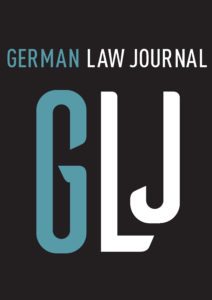Données bibliographiques / Bibliografische Daten |
|---|
| Auteurs / Autoren: | HUBERT, JULIANE; GÖRLITZ, FRANZISKA; KUCHER, JASMIN; SCHEFFER, MORITZ; WIESER, PATRICK |
|---|
| Source / Fundstelle: | https://www.cambridge.org/core/journals/german-law-journal/article/tatprovokation-the-legal-issue-of-entrapment-in-germany-and-possible-solutions/964310727F53984D02FB1BB6031289E3 |
|---|
| Revue / Zeitschrift: | German Law Journal |
|---|
| Année / Jahr: | 2019 |
|---|
| Localisation / Standort: | German Law Journal, Volume 20, Issue 4, pp. 496-509 |
|---|
| Catégorie / Kategorie: | Droit pénal, Strafrecht |
|---|
| Mots clef / Schlagworte: | Tatprovokation, Provocation à l'infraction, Provocation à la preuve |
|---|
 Abstract:
Abstract:
Incitement by police officers is a well-known and often utilized police measure in the German investigation process. Yet, when it comes to prosecuting the perpetrators, a moral conflict arises. Should a State, bound by its own constitution and committed to protect its citizens, be allowed to incite or support a possible offender and afterwards judge on his or her wrongful actions? After Germany’s higher courts had to deal with multiple cases of entrapped perpetrators, there has been a strong debate about the admissibility, requirements, and consequences of entrapment within the German legal system. International and national courts as well as scholars represent different legal standpoints in this regard. In particular, the approaches of the European Court of Human Rights and the German Federal Court of Justice differ significantly in their results. As Germany ratified the European Convention on Human Rights and therefore has to adhere to the European Court of Human Rights’ ruling, an additional legal conflict arises. This article depicts and discusses the most relevant approaches to resolve this moral and legal conflict and satisfy both the need for effective prosecution and the procedural rights of the individual person subject to the act of entrapment. Additionally, recent legislative ambitions are presented.

 Abstract:
Incitement by police officers is a well-known and often utilized police measure in the German investigation process. Yet, when it comes to prosecuting the perpetrators, a moral conflict arises. Should a State, bound by its own constitution and committed to protect its citizens, be allowed to incite or support a possible offender and afterwards judge on his or her wrongful actions? After Germany’s higher courts had to deal with multiple cases of entrapped perpetrators, there has been a strong debate about the admissibility, requirements, and consequences of entrapment within the German legal system. International and national courts as well as scholars represent different legal standpoints in this regard. In particular, the approaches of the European Court of Human Rights and the German Federal Court of Justice differ significantly in their results. As Germany ratified the European Convention on Human Rights and therefore has to adhere to the European Court of Human Rights’ ruling, an additional legal conflict arises. This article depicts and discusses the most relevant approaches to resolve this moral and legal conflict and satisfy both the need for effective prosecution and the procedural rights of the individual person subject to the act of entrapment. Additionally, recent legislative ambitions are presented.
Abstract:
Incitement by police officers is a well-known and often utilized police measure in the German investigation process. Yet, when it comes to prosecuting the perpetrators, a moral conflict arises. Should a State, bound by its own constitution and committed to protect its citizens, be allowed to incite or support a possible offender and afterwards judge on his or her wrongful actions? After Germany’s higher courts had to deal with multiple cases of entrapped perpetrators, there has been a strong debate about the admissibility, requirements, and consequences of entrapment within the German legal system. International and national courts as well as scholars represent different legal standpoints in this regard. In particular, the approaches of the European Court of Human Rights and the German Federal Court of Justice differ significantly in their results. As Germany ratified the European Convention on Human Rights and therefore has to adhere to the European Court of Human Rights’ ruling, an additional legal conflict arises. This article depicts and discusses the most relevant approaches to resolve this moral and legal conflict and satisfy both the need for effective prosecution and the procedural rights of the individual person subject to the act of entrapment. Additionally, recent legislative ambitions are presented.
